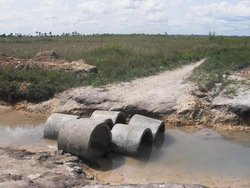Press release
Annual Monitoring Report on the Operations of Addax Bioenergy by the Sierra Leone Network on the Right to Food (SiLNoRF) for the Period June 2011 – June 2012
Despite some positive changes, there are still many issues of concern on the operations of Addax Bioenergy SL Limited
Makeni, August 6, 2012
The Sierra Leone Network on the Right to Food (SiLNoRF) has published an Annual Monitoring Report on the sugarcane-to-ethanol project of the Swiss firm Addax Bioenergy. Some positive changes are acknowledged by SiLNoRF, e.g. on employment. However, there are still many issues of concern, such as communities asking for a written agreement from Addax to prevent it from using more than the demarcated land. The rice harvests on some community fields were low and therefore not sufficient to ensure food security. The sustainability of the Farmer Development Programme (FDP), which is a mitigation measure of Addax, is still not guaranteed. Moreover, access to water is still a problem in certain communities.
SiLNoRF today published an Annual Monitoring Report on the sugarcane-to-ethanol project of the Swiss firm Addax Bioenergy. Mohamed Conteh, National Coordinator of SiLNoRF, stated that, “even if we still have many issues of concern on Addax, some positive changes are recorded by SiLNoRF during the last 12 months”. Among these are the facts:
- that Addax Bioenergy was open for dialogue with its stakeholders;
- that Addax Bioenergy paid the land lease fees according to the provisions of the Land Lease Agreements and the compensation payments for destroyed crops and economic trees;
- that there is an increase in the number of workers employed by Addax and its contractors. Salaries are higher than the minimum wage in Sierra Leone. Addax workers now have written work contracts;
- that Addax ploughed and harrowed community fields as part of the Farmer Development Programme (FDP) in nearly every affected community in 2011; the FDP farms did well in some of the communities.
The report also highlights the following issues of concern:
-
The Masethleh and the Fullah Town communities asked for an additional Memorandum of Understanding (MoU) with Addax committing the company to only use the demarcated lands. Addax should negotiate with each landowner on the portions he agrees to lease away or not and sign a written agreement with him.
-
Many community members have continued to consistently and coherently narrate the “juicy” promises made by the company and/or its agents which “lured” them to accepting to lease their lands for 50 years. The issue of these promises which Addax has denied making is a potential source of conflict especially in a country devastated by the civil war 10 years ago.
-
Addax states that the Farmer Development Programme (FDP) has resulted in a harvest of 1’600 metric tonnes of rice. This figure of 1’600 tonnes seems to be overstated. Communities in the Makari Gbanti Chiefdom indicated that the 2010 and 2011 rice harvests on the FDP fields were low and therefore not sufficient to ensure their food security. Community members at Woreh Yeama even reported to suffer from hunger, because of the too small area of FDP fields and poor harvest. The FDP relies on expensive external inputs. Instead, the FDP should promote sustainable, low-input farming systems.
-
Under the FDP, Addax is helping communities with harrowing during the first three years. During the fourth year, farmers have to pay the full costs. Will the farmers be able to pay the full costs from the fourth year on? Addax has the obligation to keep the FDP in place all time in so far as the operations will aggravate food insecurity in the communities.
-
Addax trains farmers in a 30 week training programme. However, farmers encountered difficulties in putting into practice what they have learnt because they lack the productive resources.
-
Addax Bioenergy altered the water source of the Romaro community in May 2011. The water well for this community is still to be completed. In Woreh Yeama, where Addax constructed a water well as a mitigation measure, the community asked for a written agreement from Addax obliging the company to maintain and repair the water well anytime it breaks down.
-
On several occasions, civil society organisations and/or community members were intimidated by the company or associates of the company.
The report ends with a list of recommendations to the company, policy makers (the government and local authorities) as well as to the International Development Finance Institutions.
Mohamed Conteh, National Coordinator of SiLNoRF, stated that “it is crucial that we continue to monitor both the positive developments and the issues of concern in the future”.
For more information:
Mohamed S. Conteh
National Coordinator
Sierra Leone Network the Right to Food (SiLNoRF)
60 Magburaka Highway- Makambo, Makeni,
P.O Box 5, Makeni, Sierra Leone
T +232 76 687 091/+232 88 916 263
[email protected]













